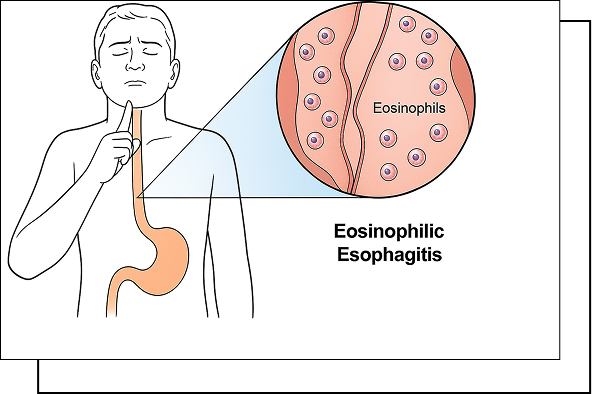Eosinophilic Esophagitis Treatment in Kolkata
Home > Esophagus Diseases > Eosinophilic Esophagitis
Overview
Eosinophilic Esophagitis (EoE) is a chronic allergic condition where a type of white blood cell, called eosinophil, builds up in the lining of the esophagus. This buildup can inflame and damage the esophageal tissue, making swallowing painful and uncomfortable. The condition is increasingly common and affects both children and adults.

Eosinophilic Esophagitis Symptoms
EoE symptoms vary by age:
Infants and Toddlers
Difficulty feeding, fussiness, vomiting, poor weight gain and growth.
Children
Abdominal pain, difficulty swallowing (dysphagia), nausea, vomiting, poor appetite, and heartburn.
Adults
Difficulty swallowing, sensation of food getting stuck in the esophagus (impaction), acid reflux, chest pain, and heartburn.
Book An Appointment
Causes and Risk Factors
EoE is linked to food allergies, environmental allergens, and genetic predisposition.
Seasonal allergies, eczema and asthma can also contribute.
Common eosinophilic esophagitis causes include reactions to milk, eggs, wheat, soy, or nuts.
Men and individuals with a family history of allergic conditions are at higher risk.
Evaluation
Diagnosing EoE typically involves a combination of tests, including:
Endoscopy
Biopsy
Allergy testing
Book An Appointment
Management
Treatment options include:
Dietary therapy
Eliminating trigger foods like dairy or wheat often helps.
Medications
Topical corticosteroids reduce inflammation, and acid-blockers manage related GERD symptoms.
Esophageal dilation
In extreme cases, this procedure helps widen a narrowed esophagus.
For personalized care, look for guidance from Dr. Debjoy Sau, an eosinophilic esophagitis doctor in Kolkata, to determine a tailored treatment plan.
Living Better
Eat slowly and chew thoroughly
Cut food into smaller pieces
Stay upright after meals
Maintain a food diary

FAQs
Know Your Answers
How is EoE different from GERD?
GERD is acid reflux, while EoE is an allergic condition causing esophageal inflammation.
What are the long-term complications?
Untreated EoE can lead to malnutrition, growth problems, and tearing of the esophagus (esophageal rupture).
Can Eosinophilic Esophagitis cause cancer?
EoE itself is not considered a precancerous condition. However, chronic inflammation can increase the risk of esophageal cancer in some cases.
Does it run in families?
There is a genetic component. If a family member has it, you might be at higher risk.
Who should I see for EoE treatment?
Consult a gastroenterologist specializing in eosinophilic esophagitis treatment for comprehensive care.

